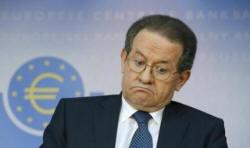|
 ECB's
Constancio sees negative inflation rate in months ahead:
magazine ECB's
Constancio sees negative inflation rate in months ahead:
magazine
 Send a link to a friend
Send a link to a friend
[December 20, 2014]
BERLIN (Reuters) - European Central
Bank Vice President Vitor Constancio said in a magazine interview he
expected the euro zone inflation rate to turn negative in the coming
months but that if this was just a temporary phenomenon, he did not see
a risk of deflation.
|
|
 Annual inflation in the euro zone slowed to 0.3 percent in November
as energy prices fell, putting it well below the ECB's target for
inflation close to but just below 2 percent. Annual inflation in the euro zone slowed to 0.3 percent in November
as energy prices fell, putting it well below the ECB's target for
inflation close to but just below 2 percent.
In early December the ECB had forecast 0.7 percent inflation for
2015 but Constancio told Germany's WirtschaftsWoche oil prices had
fallen by an extra 15 percent since then and that, while this should
support growth and so drive up inflation in the longer term, it
created a tricky situation in the short-term.
"We now expect a negative inflation rate in the coming months and
that is something that every central bank has to look at very
closely," Constancio was quoted as saying in an interview due to be
published on Monday.
But he said that several months of negative inflation would not
translate into deflation: "You'd need negative inflation rates over
a longer period for that. If it's just a temporary phenomenon, I
don't see a danger."
Constancio said the euro zone was not in deflation and there was
also not a risk of this for every country in the single currency
bloc. He added that rising productivity in countries like Ireland
and Spain could, for example, create scope for wage rises, which
would counter deflation dangers.

He said forecasts from the International Monetary Fund, the European
Commission and OECD that the euro zone's economic weakness would
continue until 2018 meant there would be downward pressure on
inflation until then.
By buying asset-backed securities (ABS), or bundled loans, which the
ECB began doing on Nov. 21, as well as purchasing covered bonds and
offering new loans to banks, the ECB aims to increase the size of
its balance sheet back to levels seen in early 2012.
Constancio said there had been no decision on what extra measures
the ECB would take to bring about monetary easing next year, adding
that the bank would, in early 2015, assess the effectiveness of
measures it had taken this year.
[to top of second column] |

He said the ECB needed to employ all monetary policy tools at its
disposal, adding that the bank must act if inflation was too low to
maintain its credibility and so would need to use channels it had
not touched before.
He said quantitative easing was "totally legal" and the ECB did not
rule out what was legal. There is currently a stand off between the
ECB and Germany's Bundesbank over ECB preparations to buy sovereign
bonds to prop up the weak euro zone economy.
On Friday Reuters reported that ECB officials were considering ways
to ensure weak countries that stand to gain most from a fresh round
of money printing bear more of the risk and cost.
German newspaper Sueddeutsche Zeitung on Saturday said the ECB was
discussing how to avoid or reduce possible collective losses for the
bank from its planned government bond purchases.
"That is an issue," the newspaper cited ECB policymaker Ardo Hansson
as saying. "It is a question of how much of the risk should be
shouldered by individual countries in the euro zone."
Constancio told WirtschaftsWoche the ECB did not have an exchange
rate target and did not measure the success of its monetary policy
measures on the basis of their impact on the euro.
(Reporting by Michelle Martin, editing by Angus MacSwan)
[© 2014 Thomson Reuters. All rights
reserved.] Copyright 2014 Reuters. All rights reserved. This material may not be published,
broadcast, rewritten or redistributed.
 |